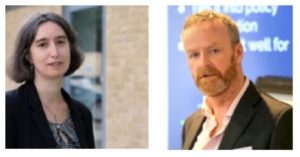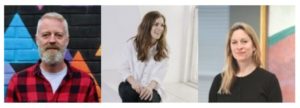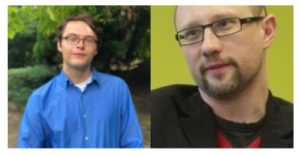Eastern Arc Conference 2021
The last 18 months have seen a huge change in our politics, our society and our personal lives. Since launching the second phase of Eastern Arc in 2019, the British Prime Minister and American President have changed, the UK has departed from the EU, and a global pandemic has challenged our society, our economy and our health services.
This year’s EARC conference looked at the aftermath of these changes. Held virtually, it examined different facets of this, from post-Brexit agriculture to cultural responses to lockdown, from our post-covid health system to the rise of extremist organisations online. Over the course of a week 16 speakers debated and discussed, speaking with knowledge and insight, and providing delegates with a clearer understanding of where we are.
The challenges to research collaboration

On the first day, the EARC Director, Phil Ward, and the British Academy’s Director of Research, Vanessa Cuthill, looked at how the past year had changed their organisations. Phil gave an overview of the achievements of EARC (summarised in its Annual Report 2020-21), the challenges and opportunities of the past year, and what the focus will be in the year ahead. After his talk, he chaired a discussion with the theme champions to understand how they had been leading the collaborative work in their areas.
Vanessa explained the work of the BA, and explained how political changes, such as the appointment of a new Science Minister, the integrated review, the departure from Europe and changes to government funding, had meant that the Academy had had to be flexible and agile. It had also responded to the pandemic by identifying nine significant areas of long-term impact, and seven strategic policy goals to help society recover.
Sustainable agriculture after Brexit

Day two brought together a panel of landowners, farmers, advocates and policy-makers to explore the government’s new framework of payments that are intended to encourage more sustainable practices. Replacing the current system of EU funding, they offer the most significant change to farming support and land management in 50 years.
The panel recognised the need for a change of focus, and that farmers were no longer just the producers of food but rather ‘asset managers’, balancing the ‘natural capital’ on their estates. To do so successfully would be challenging but essential in helping to tackle the climate crisis.
The speakers finished by discussing opportunities for academics to work with landowners to address issues that resulted from this change, from understanding the wider context and enabling informed decision-making to developing systems to accurately measure national capital.
How cultural organisations had adapted to lockdown

On the third day Mark Richards (Metal Culture), Moya Stirrup (Turner Contemporary) and Ghislaine Wood (Sainsbury Centre for the Visual Arts) discussed how each of their institutions had adapted to the challenges of Covid. They had had to respond rapidly, moving much of their activity online. This had been positive in widening access to those who hadn’t been able to go to galleries in the past, but they were aware of ‘digital poverty’ and some being excluded by this move.
They also recognised the important role they played in supporting the mental health of the nation, and they had developed creative and inspiring responses to it. One simple action had been setting up a webcam feed outside the Turner Contemporary that pointed out to sea, creating a meditative and contemplative portal in troubled times. They finished by highlighting the importance of bringing humour and joy to the arts, which helped offset the effects of an otherwise bleak environment.
The threat from online extremism

Prof Alan Finlayson opened up the penultimate day by looking at how extremism and intense politicisation had developed through social media, ‘displacing the university from the centre of discussion.’ The status of knowledge had been contested, and ‘ideological entrepreneurs’ had flourished. There were no easy answers to countering this: the frustrations and anger that had led to it were still there and keenly felt. It was necessary to engage with and understand it if universities were going to continue to play a part in informing and challenging debate.
In the second half of the discussion Dr Gareth Mott moved the focus to the challenge of cyber attacks, painting a dystopian picture of multiple threats, but finishing with a glimmer of hope in ‘cyber serenity’. To make this happen would require a change in political structures and political thinking. ‘The playbook of the 21st century will not just be written but coded,’ he said.
Integrated care systems and the post-Covid world

On the final day Prof David Croisdale-Appleby explained how the UK’s health and care provision was being transformed to enable a more ‘joined-up’ approach, bringing together the NHS, local authority and third sector bodies within a local area with the focus on improving health outcomes and reducing health inequalities. It would move the current system based on competition to one based on collaboration.
He looked at how the ICSs would work in practice, and what this may mean to those undertaking research, particularly in the EARC universities. There were clearly huge opportunities, and David outlined 10 areas in which the universities could benefit the ICSs – and vice versa.
In the second half of the session the focus shifted to the effect of Covid on the delivery of support for those affected by the virus. Lisa Smith looked at the long-term effect of Covid from a personal perspective, and the difficulty faced by doctors and researchers in understanding and tackling a new and disease. Sema Etuknwa and Antonina Semkina closed the session by exploring the significant effect of the pandemic on mental health, and how this should be addressed as the initial impact starts to wane.
The week had enabled us to explore our changed – and changing – landscape. It showed us the path we had travelled, and indicated the road ahead. But it was clear that the map was still being redrawn, and that the aftermath of the past 18 months would be felt for months and years to come.
Further resources and additional information
A number of resources are now available.
- Recordings
- Phil Ward: Eastern Arc: a year of change (Vimeo)
- Prof Alan Finlayson: ‘Deplorables’ and the Deep Web (podcast)
- Slides
- Prof David Croisdale-Appleby: Integrated Care Systems: future changes and opportunities for Eastern Arc (ppt)
- Archie Ruggles Brise: Beavering away: using the power of nature to underpin sustainable rural business (ppt)
- Glenn Anderson: Wendling Beck Exemplar Project (pdf)
- Vanessa Cuthill: Taking Stock: from 2020 into the future (ppt)
